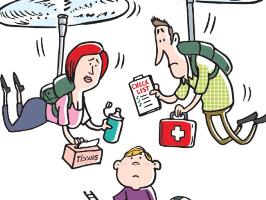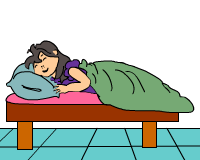Why do so many of us wait on our kids or micromanage their lives to jaw-dropping extremes? There’s plenty of evidence that this coddling is as unhealthy for them as it is exhausting for us. Read on for some insights plus advice that’ll help you land your crazy copter. The term ‘helicopter parenting’ was coined in reference to the parents who are always hovering over their child all day long like a helicopter. They would even do those tasks for their children which they are perfectly
There’s plenty of evidence that this coddling is as unhealthy for them as it is exhausting for us. Read on for some insights plus advice that’ll help you land your crazy copter. The term ‘helicopter parenting’ was coined in reference to the parents who are always hovering over their child all day long like a helicopter. They would even do those tasks for their children which they are perfectly  capable of doing themselves or otherwise would not give any freedom or privacy to their child for whatever reasons.
capable of doing themselves or otherwise would not give any freedom or privacy to their child for whatever reasons.
All parents care about their children and want to shield them from all negative things possible. It begins at birth, when we take extra care of our children to make sure they are far away from any harm. This may include baby-proofing the apartment, putting ‘baby on-board’ sign on cars, sanitizing everything, etc. This continues as the baby grows into a toddler, preteen, a teenager and sometimes even as they become an adult! After all, the safety and well being of children is of utmost importance to parents. But how do we know at which moment, we can just let the child be?
Often parents tend to over-involve themselves thinking it will ensure that their children always give their best performance and without them hovering over their children, they will not take things like academic performance or nutritional value of their food, seriously. Though it is true that constant involvement of parents may temporarily improve their performance, in the long term it may lead the students to be anxious all the time. This may be ‘social anxiety’, where the children find it difficult to socialize with strangers or their peers or ‘general performance anxiety’ where the students feel that they always have to be ‘perfect’ at everything and any result less than that is not satisfactory or acceptable.
This clip from the popular television show The Simpson does a good job at describing what helicopter parenting is and how often parents see their peers doing helicopter parenting and therefore feel the need for them to indulge in the same.
https://www.youtube.com/watch?v=dZl47PD5AYE
Children need and appreciate the help of adults, especially their parents in performing certain tasks and in life in general. But once a level of involvement is reached, good parenting can become over-parenting that poses serious risks to the development of the offspring and may even disturb their mental health.

A growing body of evidence indicates that being a (s)mother or a super-protective dad can backfire badly. Among the latest studies is one from North Carolina State University, in which researchers studied kids and their parents in 20 parks over a two-month period. They found that children whose folks hovered and fretted were far less apt to engage in spontaneous play and missed out on some much-needed exercise. Psychologists at the University of Washington studied more than 200 kids and their moms for three years and found that when a child already had pretty good judgment and self-control, having a heli-mom who provided too much guidance and not enough independence raised his risk of becoming anxious or depressed
Over-involvement of parents in the life of their teenagers can harm them in different ways.  Overly criticizing parents can make their children feel worthless which may dissuade them from ever trying anything on their own or lose their confidence thinking they are not good enough. On the other hand, overly protective parents who take care of everything for their children may make them believe that success is always served on plate and they may never actually learn to put their best effort in anything they do. While this involvement may yield better results in short term, such as in terms of better grades and a sense of achievement for the kids but as they grow older and parents become incapable of helping them in every task, it can be very troubling since they will tend to get annoyed when things are not getting done or they face failure. This can further lead to depression in the children.
Overly criticizing parents can make their children feel worthless which may dissuade them from ever trying anything on their own or lose their confidence thinking they are not good enough. On the other hand, overly protective parents who take care of everything for their children may make them believe that success is always served on plate and they may never actually learn to put their best effort in anything they do. While this involvement may yield better results in short term, such as in terms of better grades and a sense of achievement for the kids but as they grow older and parents become incapable of helping them in every task, it can be very troubling since they will tend to get annoyed when things are not getting done or they face failure. This can further lead to depression in the children.

JPEG Pro
Most parents would absolve their kids of taking responsibility of day to day tasks, such as washing their clothes, doing dishes, taking out the garbage or even serving their own dinner, just to ensure that no hurdle gets in the way of them securing astounding grades in school. But by doing so, are the parents enabling their offspring to grow into a responsible adult? Not necessarily. In fact, they might be paving way for their children to grow into half-baked adults who can’t take care of themselves and still have to rely on others for advice or guidance for every important action they take.
So, when does parenting become helicopter parenting and how can we avoid it? Parenting becomes stressful when children are not allowed their space to grow as individuals. While it is very much expected that parents be there for their child in time of need and dread but do no encroach too much. Let the  children make some of their own decisions, let them deal with small failures in life, allow them to be disappointed sometimes and when you think that things are getting really stressful for kids to deal by themselves, help them figure out and solve their problems instead of doing so yourself directly. Remember, the sign of good parenting is that the parenting is actually done by the time the offspring turns into an adult.
children make some of their own decisions, let them deal with small failures in life, allow them to be disappointed sometimes and when you think that things are getting really stressful for kids to deal by themselves, help them figure out and solve their problems instead of doing so yourself directly. Remember, the sign of good parenting is that the parenting is actually done by the time the offspring turns into an adult.



 can relieve stress, reduce depression and improve cognitive functions. 62% of the people who did exercise to reduce stress found it effective against 33% and 29% who found watching TV and going online effective respectively. But not all of us are able to take time out for workout every day. However, in order to deal with stress, you don’t need a dedicated hour at the gym. Short spans of physical activities that can raise the heart rate are perfect especially if these constitute more than 30 minutes of your day’s time. This can be ensured by:
can relieve stress, reduce depression and improve cognitive functions. 62% of the people who did exercise to reduce stress found it effective against 33% and 29% who found watching TV and going online effective respectively. But not all of us are able to take time out for workout every day. However, in order to deal with stress, you don’t need a dedicated hour at the gym. Short spans of physical activities that can raise the heart rate are perfect especially if these constitute more than 30 minutes of your day’s time. This can be ensured by:
 coffee. Opt for black tea/coffee or green tea.
coffee. Opt for black tea/coffee or green tea. feelings of optimism, happiness, self-esteem and resilience can help protect not only against mental health problems but physical ones as well.
feelings of optimism, happiness, self-esteem and resilience can help protect not only against mental health problems but physical ones as well. depression and can make mental health symptoms worse, according to the National Alliance on Mental Illness (NAMI).
depression and can make mental health symptoms worse, according to the National Alliance on Mental Illness (NAMI).
 report symptoms of stress than those who sleep less than 8 hours.
report symptoms of stress than those who sleep less than 8 hours.

























